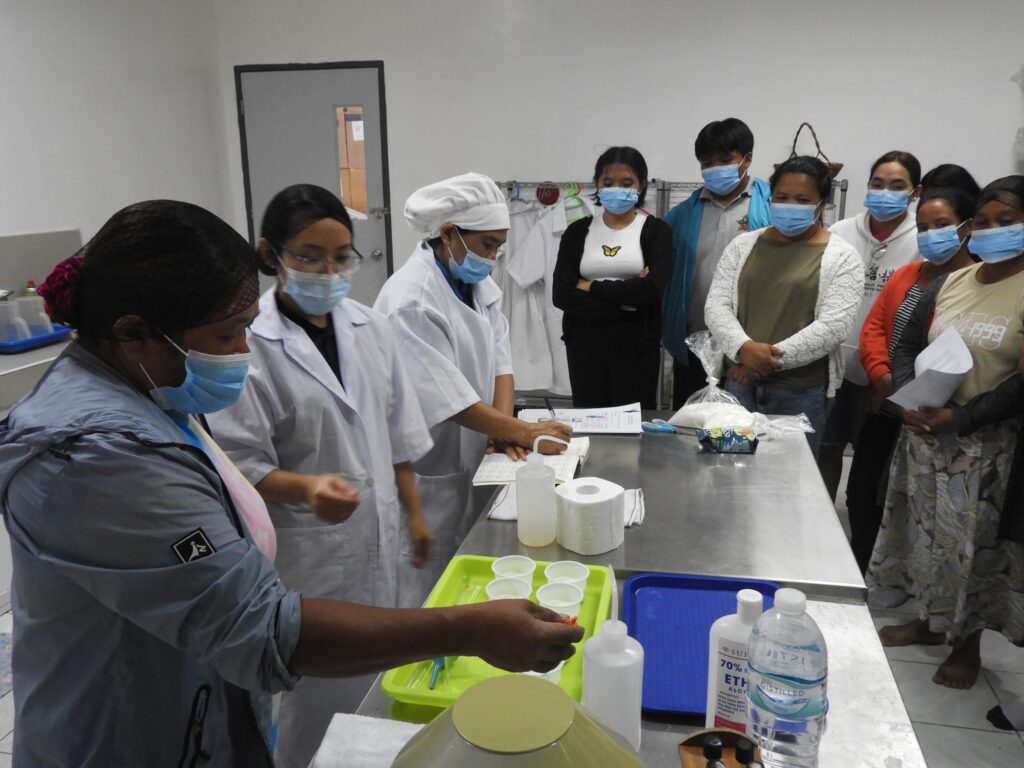The art of carabao milking holds a significant place at the Philippine Carabao Center (PCC). This institution not only champions the conservation and improvement of carabao breeds but also plays a pivotal role in advancing dairy production through innovative milking techniques and sustainable farming practices.
CapSU-LRDC Director and DOST-CEST Project Leader Dr. Emely J. Escala organized a learning visit at Philippine Carabao Center, West Visayas State University, Calinog, Iloilo last July 04, 2024.
The said activity was attended by the Department of Science and Technology (DOST) Capiz Office Personnel; Extension Director; CapSU-Pontevedra Extension Coordinators; Pontevedra Municipal Agriculture Office (MAO) Technicians; Brgy. Binuntucan Officials; and Brgy. Binuntucan Farmers.

The visit aims to allow the farmers-beneficiaries, project team members, and stakeholders to observe the daily operations of dairy farmers in Calinog. It presents an opportunity for them to engage firsthand and organized the potential of dairy farming as a promising livelihood. Additionally, the visit will showcase to stakeholders such as LGU and DOST the aspects of dairy research, extension, and production, encouraging their contribution to a sustainable dairy industry in our province.
Visiting the PCC isn’t just a journey; it’s an educational experience that enriches their understanding of livestock management, sustainable farming practices, and the crucial role of the carabao in Filipino agriculture.
A visit to the Philippine Carabao Center offers farmers of Brgy. Binuntucan a range of learning opportunities designed to equip them with practical knowledge and skills:
- Hygienic Standards: Strict hygiene protocols are followed to maintain milk quality and prevent contamination. Milking equipment is thoroughly cleaned and sanitized between uses to ensure the safety and purity of the milk.
- Gentle Handling: Carabaos are treated with care and respect during milking. Skilled handlers use calm techniques to minimize stress, creating a conducive environment that promotes milk letdown and maximizes yields.
- Testing and Analysis: Milk samples are regularly tested for purity and nutritional content, ensuring compliance with standards for dairy products. This data informs ongoing research and development efforts to enhance milk production and nutritional value.
- Optimized Milk Production: Techniques such as hand milking or using mechanical milking machines are employed based on the preferences and needs of the carabaos. Each method is carefully selected to balance efficiency with the comfort of the animals.
- Livestock Management: Farmers learn about best practices in carabao breeding, nutrition, and health management. Workshops and demonstrations provide insights into improving milk and meat yields while ensuring animal welfare.
- Technology Transfer: The center showcases innovative technologies such as artificial insemination (AI) and embryo transfer (ET) techniques, which are instrumental in improving herd genetics and productivity. Farmers gain hands-on experience and guidance from experts in these cutting-edge practices.
- Forage and Feed Management: Sustainable feeding practices are emphasized, highlighting the importance of nutritious forage crops and balanced diets for carabaos. Farmers receive guidance on optimizing feed resources to enhance animal health and productivity.
A visit to the Philippine Carabao Center is not merely a trip; it’s an immersion into the heart of Filipino agriculture, where innovation meets tradition, and knowledge transforms livelihoods. For farmers of Brgy. Binuntucan, Pontevedra, Capiz it represents an invaluable opportunity to learn, grow, and contribute to the sustainable development of Philippine agriculture. As the center continues to evolve and expand its reach, its impact on rural communities and the agricultural landscape of the Philippines remains profound and enduring.
